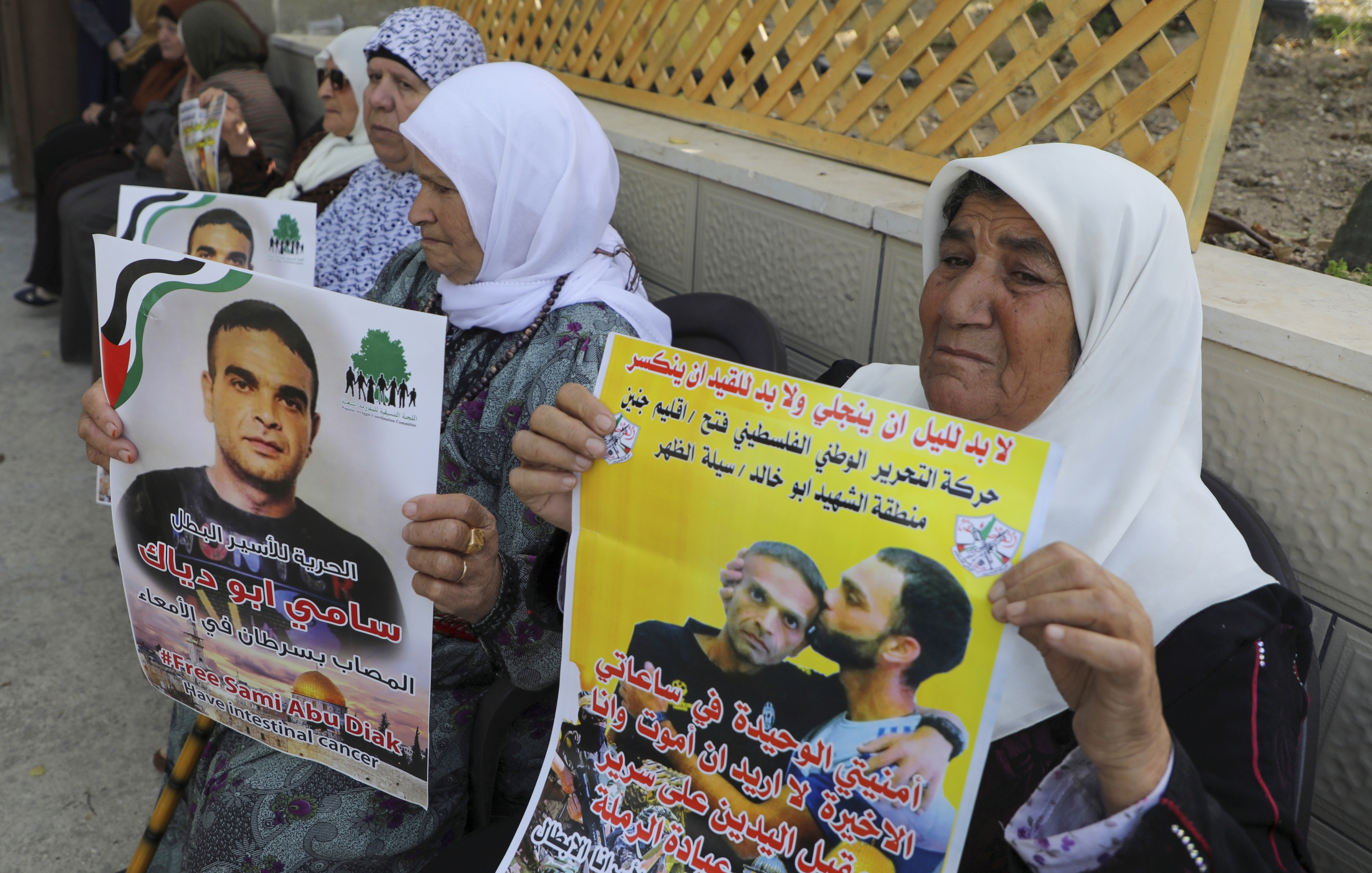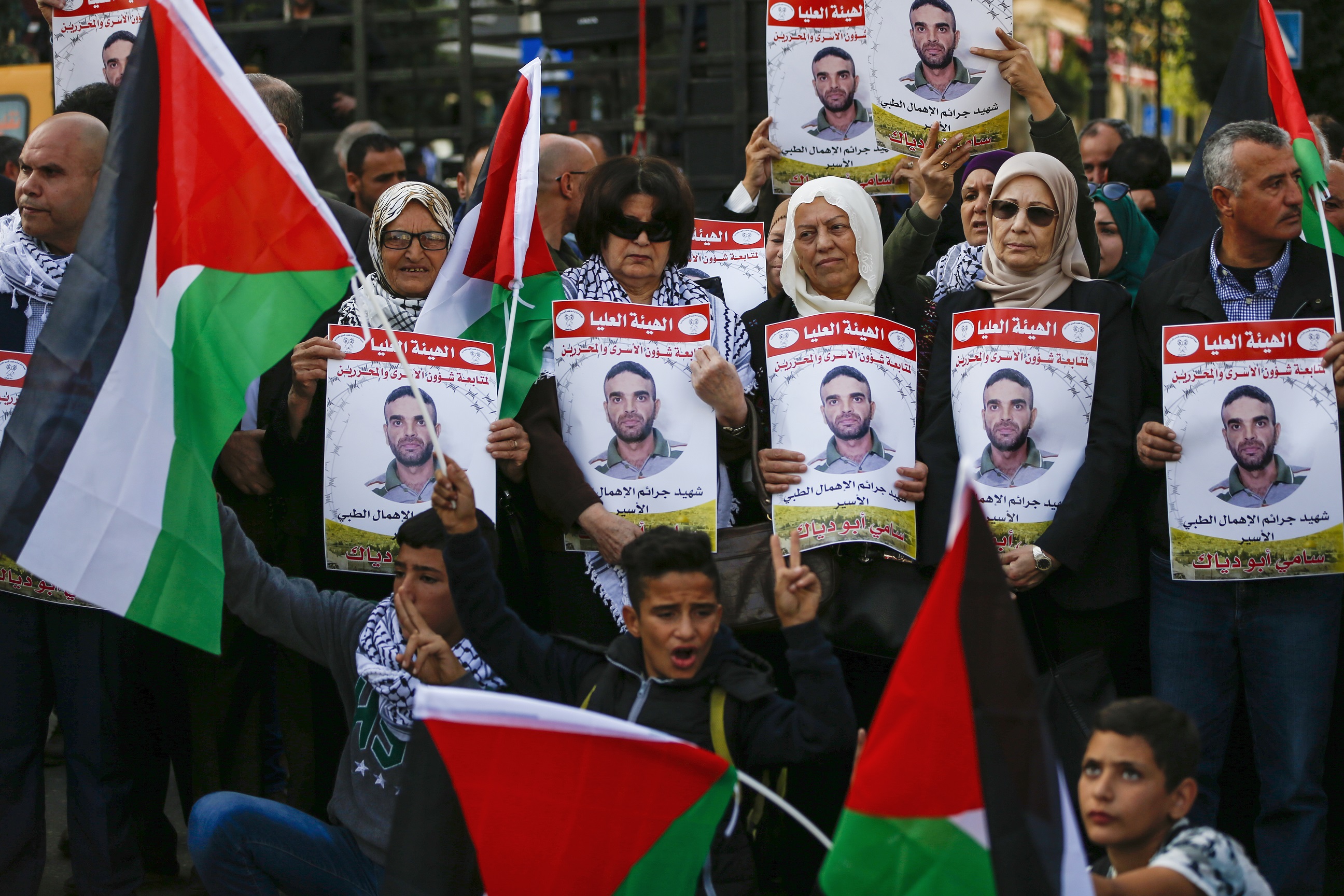Claims of neglect as Palestinian dies of cancer in Israeli prison

Palestinian detainee Sami Abu Diyak died of cancer in an Israeli prison on Tuesday, due to what his family and rights group are calling medical negligence from prison authorities.
Abu Diyak, 36, was suffering from terminal cancer and had been refused compassionate leave to be with his family, the Official Palestinian news agency Wafa said.
"To every person with a conscience, I live my last hours and days. I want to be in my last days and hours beside my mother and my loved ones, and I want to die in her arms,” Abu Diyak’s last message from prison said.
“The occupation authorities knew he was dying and yet refused to release him,” said Sahar Francis, director of the Palestinian prisoner support organisation, Addameer.
Abu Diyak died at the Israeli Ramla prison clinic without a family member by his side.
Stay informed with MEE's newsletters
Sign up to get the latest alerts, insights and analysis, starting with Turkey Unpacked
His family was informed of his death by the Israeli prison administration on Tuesday morning. Despite the shock, the news was not surprising.
Abu Diyak had been battling cancer since 2015. Since then, his health condition had continuously deteriorated. Ten days ago, he suffered a serious health setback, with doctors expecting him to succumb to the illness at any moment, according to Francis.
Abu Diyak is the fifth Palestinian to die in Israeli custody this year. Addameer said Abu Diyak’s death was a result of deliberate medical neglect on behalf of the Israeli prison authorities.
Israeli forces arrested Abu Diyak in his hometown near Jenin during the second Palestinian Intifada, or uprising, in 2002. He was convicted of killing three people and given three life sentences by an Israeli military court.
Addameer documented that he had suffered physical and psychological torture during interrogations.
Misdiagnosis
In 2015, Abu Diyak began experiencing severe stomach pain.
“The prison administration only gave him pain-killers, until he could not take any more,” said Thaer Shreiteh from the Palestinian Prisoners Affairs Commission.
Shreiteh said Abu Diyak was at first misdiagnosed with an appendix problem before doctors discovered he was suffering from intestinal cancer.
“He underwent three surgeries, all of which resulted in internal bleeding, worsening his condition,” he added.
His brother, Ali, recalled that after his last surgery, Sami stayed in the Israeli Soroka hospital for three days without treatment.
“His wound was bleeding because the Israeli members of staff were on holiday,” he said.
The Israeli prison administration allowed him to receive chemotherapy in 2016. The following year, the chemo sessions were suspended “because cancer had spread all over his body and chemotherapy had no more effect,” Shreiteh said.
Lost battle
Earlier this year, Sami Abu Diyak entered the last phase of his lost battle against cancer.
His mother was able to visit him for the last time last Thursday.
“He was unable to speak, barely moved his eyes,'' she recalled.
The Palestinian Prisoners Affairs Commission requested compassionate leave for Abu Diyak, but Israeli authorities refused on the grounds “that his health condition was stable”, Shreiteh said.
“This is a deliberate act of vengeance against the prisoner’s family, aggravated by the retention of his body, which constitutes collective punishment. A war crime under international law,” Francis said.
Over 200 Palestinians have died in Israeli prisons since 1967, some 67 of whom have died as a result of medical neglect. Israel still retains the bodies of five of them.
Middle East Eye delivers independent and unrivalled coverage and analysis of the Middle East, North Africa and beyond. To learn more about republishing this content and the associated fees, please fill out this form. More about MEE can be found here.





